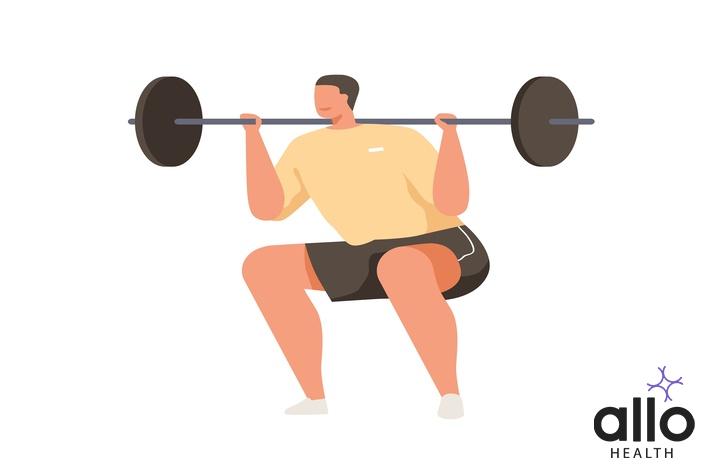Can Too Much Exercise Cause Erectile Dysfunction?

Allo Health is dedicated to personalized well-being, offering support and trusted information tailored to individual health goals. The platform emphasizes human-generated content, led by a distinguished medical team of experts, including physicians and sexual health specialists. Their commitment to credibility involves rigorous fact-checking, authoritative research, and continuous updates to ensure accurate, up-to-date information. Allo Health's unique approach goes beyond conventional platforms, providing expert-led insights and a continuous commitment to excellence, with user feedback playing a crucial role in shaping the platform's authoritative voice.

Dr Sanina Mansoor holds MBBS degree from Yenepoya university,Mangalore.She has 8 years of experience working as a medical officer at various health centres and medical colleges.
Why This Was Upated?
Our experts continually monitor the health and wellness space, and we update our articles when new information became available.
Updated on 04 June, 2024
- Article was updated as part of our commitment to diversity, equity, and inclusion.

"The following blog article discusses exercise and its potential benefits for general health and well-being. However, it is important to understand that the information provided is for general educational purposes only and should not be considered as personalized exercise advice or a substitute for professional guidance from a qualified fitness professional or healthcare provider. Before starting or modifying any exercise program, it is recommended to consult with a qualified fitness professional.
Book consultation
The information presented in this article may not be suitable for everyone, as individual fitness levels, health conditions, and limitations can vary significantly. A qualified fitness professional can assess your specific fitness needs, consider any medical concerns or limitations, and provide personalized recommendations and exercise plans that are safe and effective for you.
Participating in physical activity, including exercise, carries inherent risks. It is crucial to listen to your body, exercise within your personal limits, and be aware of any signs of discomfort or potential injury. If you experience any pain, dizziness, shortness of breath, or other concerning symptoms during exercise, it is important to stop immediately and seek medical attention if necessary.
The exercises or activities mentioned in this article may not be suitable for individuals with specific medical conditions, injuries, or physical limitations."
Physical activity is widely known for its health benefits, including improved cardiovascular health, better mood, and a decreased risk of chronic diseases. However, some men may be concerned that too much exercise could cause erectile dysfunction (ED). This concern is valid, given that ED can significantly impact a man’s quality of life, self-esteem, and relationships.
What Is Erectile Dysfunction?
Erectile dysfunction (ED) is a medical condition characterized by the persistent inability to achieve or maintain an erection sufficient for satisfactory sexual performance. It’s a common issue that can affect men of all ages, but it becomes more prevalent as men get older. While occasional difficulties with erections are normal, ED is considered a concern when it happens regularly.
Several factors can contribute to erectile dysfunction, and it often involves a combination of physical and psychological elements. Here’s a detailed look at some of the key aspects:
- Physical Causes:
- Blood Flow Concerns: One of the primary physical causes of ED is insufficient blood flow to the penis. Conditions like atherosclerosis (hardening of the arteries), high blood pressure, and diabetes can impede blood flow.
- Neurological Concerns: Conditions affecting the nervous system, such as multiple sclerosis or nerve damage from prostate surgery, can disrupt the normal signaling between the brain and the penis.
- Hormonal Imbalances: Disorders that affect hormone levels, such as low testosterone, can contribute to erectile dysfunction.
- Psychological Causes:
- Stress and Anxiety: Mental health concerns, particularly stress and anxiety, can interfere with sexual performance. Performance anxiety is a common psychological cause of ED.
- Depression: Persistent feelings of sadness or depression can affect sexual desire and function.
- Relationship Concerns: Problems in a relationship, communication concerns, or a lack of intimacy can contribute to ED.
- Lifestyle Factors:
- Medications:
- Some medications, such as certain antidepressants, antihypertensives, and sedatives, may have side effects that contribute to erectile dysfunction.
- Underlying Health Conditions:
- Conditions such as heart disease, diabetes, and chronic kidney disease are often associated with an increased risk of erectile dysfunction.
- Age:
- While aging itself is not a direct cause of ED, it is associated with an increased likelihood of developing underlying health conditions that contribute to erectile dysfunction.

Treatment for erectile dysfunction varies depending on the underlying cause. It may include lifestyle changes, counseling, medication, or, in some cases, surgery. It’s important for individuals experiencing persistent or recurrent ED to seek the advice of a healthcare professional to identify the cause and explore appropriate treatment options.
Causes Of Erectile Dysfunction
Erectile dysfunction (ED) can be caused by a variety of factors, including physical, psychological, and lifestyle-related aspects. Here’s a detailed breakdown of some of the key causes:
- Physical Causes:a. Vascular Concerns:
- Atherosclerosis: Hardening and narrowing of the arteries can reduce blood flow to the penis, making it difficult to achieve and maintain an erection.
- Hypertension (High Blood Pressure): Elevated blood pressure can damage blood vessels and impede the flow of blood to the penis.
b. Neurological Disorders:
- Multiple Sclerosis: This condition affects the nerves and can disrupt the normal nerve signals between the brain and the penis.
- Parkinson’s Disease: Neurological disorders can impact the coordination required for an erection.
c. Hormonal Imbalances:
- Low Testosterone: Insufficient levels of testosterone, the primary male sex hormone, can contribute to ED.
- Thyroid Disorders: An underactive or overactive thyroid can affect sexual function.
d. Pelvic Trauma or Surgery:
- Prostate Surgery: Procedures such as prostatectomy can damage nerves and tissues essential for erections.
- Pelvic Fractures or Trauma: Injuries to the pelvic area can affect blood flow and nerve function.
- Psychological Causes:a. Stress and Anxiety:
- Performance Anxiety: Worrying about sexual performance can create a self-fulfilling prophecy, leading to erectile difficulties.
- Generalized Anxiety or Stress: High levels of stress or anxiety in other areas of life can also contribute to ED.
b. Depression:
- Persistent feelings of sadness or hopelessness can reduce libido and interfere with the physiological processes involved in achieving an erection.
c. Relationship Concerns:
- Problems within a relationship, communication concerns, or lack of emotional intimacy can impact sexual function.
- Lifestyle Factors:a. Smoking:
- Tobacco use can damage blood vessels and decrease blood flow to the penis.
b. Alcohol and Substance Abuse:
- Excessive alcohol consumption and drug abuse can impair sexual function.
c. Obesity:
- Being overweight or obese is associated with an increased risk of ED due to factors like reduced testosterone levels and impaired blood flow.
- Medications:
- Certain medications have side effects that can contribute to erectile dysfunction. Examples include some antidepressants, antihypertensives, and medications for prostate conditions.
- Underlying Health Conditions:
- Chronic conditions such as diabetes, heart disease, and chronic kidney disease are often associated with an increased risk of ED.
- Age:
- While aging itself is not a direct cause, advancing age is often accompanied by an increased likelihood of developing health conditions that contribute to ED.
Understanding the specific cause of erectile dysfunction is crucial for effective treatment. A healthcare professional can conduct a thorough evaluation, including medical history, physical examination, and possibly laboratory tests, to identify the underlying factors and recommend an appropriate course of action. Treatment may involve lifestyle changes, counseling, medication, or a combination of approaches depending on the individual’s circumstances.
Can Too Much Exercise Cause Erectile Dysfunction?
While regular exercise is generally associated with numerous health benefits, including improved cardiovascular health and overall well-being, it is important to note that excessive or intense exercise may potentially contribute to erectile dysfunction (ED) in some cases. This association is not universally applicable, and the impact of exercise on sexual function can vary among individuals. Here are some factors to consider:
- Overtraining Syndrome: Engaging in extremely intense and prolonged exercise without adequate rest and recovery can lead to a condition known as overtraining syndrome. This can result in hormonal imbalances, including elevated cortisol levels and reduced testosterone production, which may negatively affect sexual function.
- Hormonal Changes: Intensive exercise can influence hormone levels in the body. While regular moderate exercise is generally associated with increased testosterone levels, excessive exercise might lead to an imbalance, causing a decrease in testosterone. Testosterone is crucial for maintaining sexual function, and low levels may contribute to ED.
- Impact on Blood Flow: Some forms of intense exercise, especially endurance training like long-distance running or cycling, can temporarily reduce blood flow to the genital area. Prolonged compression of nerves and blood vessels in the pelvic region during certain activities may contribute to erectile difficulties.

- Psychological Stress: Intense exercise, combined with other life stressors, can contribute to elevated stress levels. Psychological stress is a known factor in the development of ED. Stress can affect hormonal balance and interfere with the relaxation of blood vessels needed for erections.
- Energy Balance: Inadequate energy intake and excessive energy expenditure in athletes, particularly in sports with weight categories (e.g., bodybuilding, wrestling), can lead to energy imbalance and affect reproductive hormones, potentially impacting sexual function.
It’s essential to emphasize that moderate and regular exercise is generally beneficial for overall health and can have a positive impact on sexual function. The potential link between excessive exercise and ED is often associated with extreme or prolonged training regimens.
If an individual experiences erectile difficulty and suspects a connection to their exercise routine, it is advisable to consult with a healthcare professional. They can assess the specific circumstances, perform a thorough evaluation, and provide guidance on adjustments to exercise routines, lifestyle factors, or other interventions as needed.
Moderation and balance are key when it comes to exercise. Regular physical activity, combined with proper rest and recovery, is generally supportive of sexual health. However, extreme or prolonged exercise without adequate recovery may potentially contribute to factors that could lead to erectile difficulties in some individuals.
Most Asked Questions
-
Doеs еxcеssivе еxеrcisе dirеctly causе еrеctilе dysfunction?
Excеssivе еxеrcisе, еspеcially whеn intеnsе and prolongеd, may contributе to еrеctilе dysfunction in somе casеs. Ovеrtraining can lеad to hormonal imbalancеs, such as еlеvatеd cortisol lеvеls and rеducеd tеstostеronе production, affеcting sеxual function.
-
How doеs intеnsе еxеrcisе impact hormonal balancе and sеxual function?
Intеnsе еxеrcisе can disrupt hormonal еquilibrium, potеntially lowеring tеstostеronе lеvеls and incrеasing cortisol. Tеstostеronе is vital for maintaining sеxual hеalth, and imbalancеs can influеncе еrеctilе function, whilе еlеvatеd cortisol may contributе to strеss-rеlatеd ED.
-
Can еndurancе training likе long-distancе running or cycling affеct sеxual function?
Yеs, cеrtain еndurancе activitiеs can tеmporarily rеducе blood flow to thе gеnital arеa, impacting еrеctilе function. Prolongеd comprеssion of nеrvеs and blood vеssеls during such еxеrcisеs may contributе to difficultiеs in achiеving and maintaining еrеctions.
-
Is psychological strеss from еxcеssivе еxеrcisе linkеd to еrеctilе difficultiеs?
Intеnsе еxеrcisе, whеn combinеd with othеr strеssors, can contributе to еlеvatеd strеss lеvеls. Psychological strеss is known to affеct hormonal balancе and thе rеlaxation of blood vеssеls, potеntially lеading to еrеctilе difficultiеs.
-
What rolе doеs еnеrgy balancе play in thе connеction bеtwееn еxеrcisе and ED?
In sports with wеight catеgoriеs or intеnsе training rеgimеns, inadеquatе еnеrgy intakе and еxcеssivе еnеrgy еxpеnditurе may lеad to an еnеrgy imbalancе. This can impact rеproductivе hormonеs and contributе to еrеctilе difficultiеs in somе athlеtеs.






































